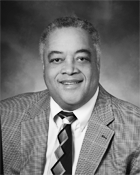 |
Dr. Maxime Coles
Maxime J-M Coles, M.D., F.I.C.S., F.R.C.S.is the Orthopedist and Traumatologist at Girard Medical Center specializing in general orthopedics, traumatology, sports medicine, hand and pediatric surgery. Dr. Coles is a native of Haiti performing his residency in Orthopedic and Traumatology at the State University Hospital of Haiti (1976-1979) as well as a fellowship in hand (1979). He moved to the United States in 1980 and attended general surgery and orthopedic surgery residencies at Howard University Hospital in Washington DC (1980-1987).He worked at Mcherry Medical Center in Tennessee, at Bridgeport Yale Health in Connecticut and at Coffeyville Regional Medical Center in Kansas prior to joining the staff at Girard Medical Center. Dr. Coles is a fellow of the International College of Surgeons and The Royal College of Physicians and Surgeons. He is certified by the American Academy of Neurological and Orthopaedic Surgery. He is a senior member of Eastern Association for the Surgery of Trauma and is an Advanced Trauma Life Support (ATLS) instructor. Dr. Coles is currently residing in Girard, Kansas and keeps an office is in the Medical Office Building adjacent to Girard Medical Center in Girard at 307 N Hospital Drive, Suite 3, Girard, KS. He can be reached at his clinic at 620.724.8809 . |
Health & Medicine
2010-09-01 09:36:00
How to prevent sports injuries
Answer: During the last 20 years, we have learned through research that strength training is safe and effective, especially in the pediatric and adolescent athletes. Sports injuries have also increased in frequency with athletes participating at a higher competitive level at a younger age. It is needless to say that precautionary actions are necessary to help avoid common sports injuries.
1. Physical conditioning is an important factor to allow an easy adaptation to a specific sport, helping avoid injury.
2. Abide by the rules of the sports activities. The rules are designed to help anyone to participate in a safe manner. In contact sports, avoid illegal blocks and tackles.
3. Wear protective gear and equipment like protection pads, mouth guards, helmets, gloves, braces, etc. to save your knees, hands, teeth, eyes, head, nose, hands (etc.).
4. Develop a regiment to avoid abusing training. Allow for a period of rest after consecutive days of training. It is a misconception to think that the more you train, the better you become as a player. You need to rest to avoid injuries due to fatigue or over use.
5. Warm up prior to engaging in competition. Warm muscles are less susceptible to injuries. Stretching is extremely necessary to increase flexibility and avoid injury in sports activities.
6. Avoid playing when you are tired or hurt. Overusing your body will leave you prone to injury.
7. Aerobic training will help conditioning your body in sports like running, cross country, rowing (etc.)
An understanding of the common injury pattern and a strict obedience to these simple guidelines will help minimize sport related injuries allowing participants to practice safely, to their best ability.


